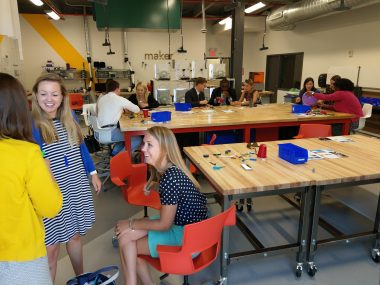The new space on the third floor of Elon Town Center on North Williamson Avenue is hosting an open house from 3 to 5 p.m. on Thursday, Aug. 24.
Elon’s maker community is celebrating a new space to build, carve, saw, craft and create with the launch of the new Maker Hub – Downtown in Elon Town Center early next month.
Housed in space that was formerly home to student media offices, the new maker hub is Elon’s second, and complements the offerings of Maker Hub – Colonnades that opened in 2015. The downtown location features more than twice as much space as the original hub with new equipment including 3D printers, a CNC router, a laser cutter/engraver, tools and vented soldering stations.
Dan Reis, senior instructional technologist with Teaching and Learning Technologies, said interest in the initial maker hub created the need for additional space with more capabilities. During the last academic year, the Maker Hub in Harper Hall in the Colonnades Neighborhood saw more than 1,600 visits from students, faculty and staff, thanks in part to interest in the Elon Kickbox grant program that helps support student maker projects.
“There have been many conversations about how a maker space fits into Elon’s residential campus goals, and how we can give more access and provide more equipment to help them make even more interesting projects,” said Reis, who oversees both hubs.
The Elon community is invited to take a look at the new space during an open house from 3 to 5 p.m. on Thursday, Aug. 24. Maker Hub – Downtown will officially open for use on Sept. 6.
The space on the third floor of Elon Town Center became available with the relocation of the offices of The Pendulum, Elon’s student-run newspaper, to the new Schar Hall. A portion of that space was redesigned for use by the Design Thinking Studio in Social Innovation course, with the remainder refashioned during the summer as the second Maker Hub, with the space designed by the university’s Planning, Design & Construction Management Department.
Designing the second hub involved looking at what offerings and equipment had been most popular at the hub in Harper Hall and how to differentiate the two. “The consensus in planning for the new hub was the build off the strengths of the current hub,” Reis said.

This summer, Josh Donnald ’19 was one of two student staff members for the hub who helped prepare the new space for use. Donnald grew up undertaking woodworking and metalworking projects with his father, and so when he ended up living in Harper Hall just a few doors down from the Maker Hub, it was a natural fit.
Getting Maker Hub – Downtown has made for a hectic summer “but in a fun way,” Donnald said, and in true maker form, he and others used some of the new equipment to fashion racks and shelving to outfit the space.
“There are endless possibilities for what you can create in this new space,” Donnald said. “There’s definitely a ‘wow’ factor with the new hub, with more equipment and exciting new things.”
A challenge remains in that some who are interested in what the maker space has to offer are intimidated by the equipment or their lack of experience, Reis said. To help address that, both of the hubs are staffed by students who are trained to work all of the equipment and can offer support. Faculty can schedule orientations sessions for specific classes that offer an overview of the equipment in the hub, Reis said.
The hope is that more faculty will integrate the opportunities that the two Maker Hubs offer into the courses they teach, he said. There is already a strong connection between the hub and the Design Thinking Studio in Social Innovation course, which has its classroom connected to the hub.
This year is also likely to feature “sample projects” for various pieces of equipment to help users familiarize themselves with the new offerings. “These projects are designed to take 30 minutes or less, and are a nice way to give a user a quick project they can complete to build their confidence,” Reis said.
Maker Hub – Downtown also includes space to add new equipment in the future based upon demand. “If there are things students, faculty and staff want to have access to that we don’t have, let us know and if we have the room and expertise to operate it safely, we may be able to add it,” Reis said. “We purposely didn’t fill the space with everything we could think of for just that reason.”
More information about both of Elon’s Maker Hubs is available at www.elon.edu/makerhub.


